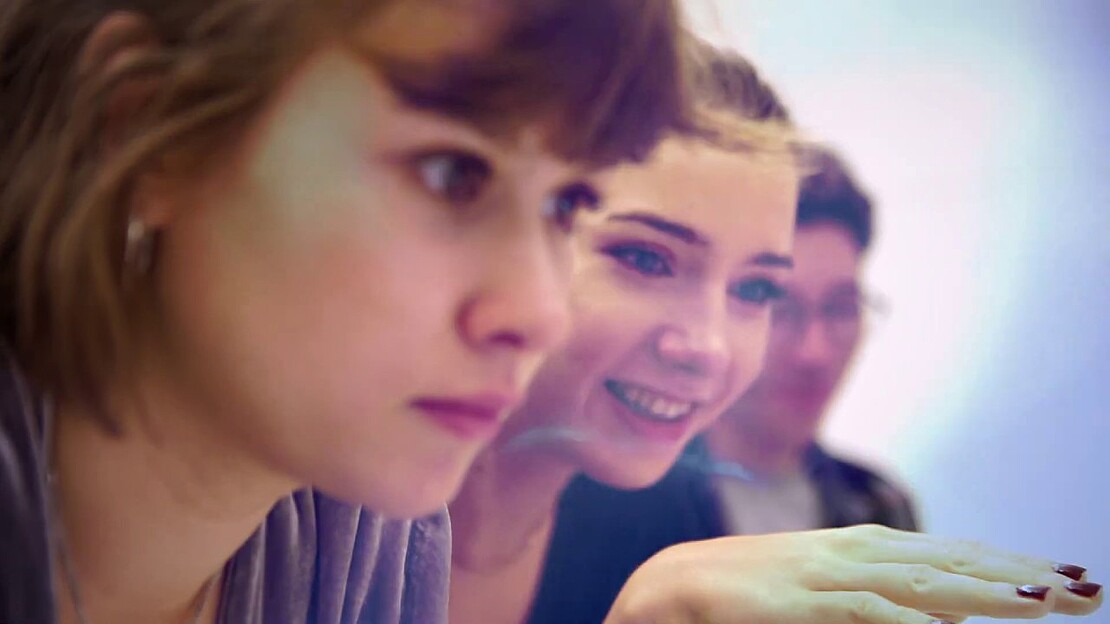Media Systems
The practice-oriented Media Systems degree course qualifies students as computer scientists specialised in digital media who, in addition to posessing core computer science knowledge, are skilled in the areas of software development, network and server technology, project management, multimedia services, and storage technologies for the media sector.
Media Systems graduates plan, design and programme software (games, web applications, apps, VR/AR), design and develop multimedia services for the media sector, and plan and implement secure IT networks. Within professional teams they are often the interface between the various disciplines (illustrators, web designers, game designers, IT experts). A Bachelor's degree in Media Systems makes it possible to obtain a further qualification through a Master's degree course in Digital Reality (M.Sc.) or Sound – Vision – Games (M.A.).
Your future career
................................................................................................................................................................................................
Communication and multimedia – hardly any other economic sector is developing so dynamically and influencing technological and societal developments so strongly.
Hamburg has significant locational advantages here: a creative media branch, a strong computer games sector, and a growing VR/AR scene. A large number of both young and established companies are developing software applications in these areas, increasingly across genres. This is opening up a multitude of new and exciting work areas for Media Systems graduates.
Media Systems graduates are responsible for the conception, design and programming of software applications (games, Internet applications, mobile apps, VR/AR systems). They are also qualified to plan and construct IT networks and servers, particularly in the multimedia sector, or to ensure IT security in companies. These fields typically require interdisciplinary collaboration with designers and media technology experts.
Media Systems graduates work as both employees and freelancers. Their employers or clients include software firms, Internet and games agencies, and audiovisual media companies.
Course content and structure
................................................................................................................................................................................................
The course’s first year focuses on foundational courses in mathematics, computer science, programming and design, AV technology, and media and society.
The second year deepens and expands on these topics with courses in networks, cryptography, software engineering, virtual systems and computer graphics.
In your third year, you’ll specialise by choosing a variety of advanced technical and design-related courses, such as media design, storage management, mobile systems, interactive systems, mixed reality and databases.
The courses are taught in seminars with roughly 40 participants, and are sometimes complemented with practical small-group exercises in modern media labs and studios. Creative and artistic topics are covered in special courses. The technical and design objectives of the degree course are linked in three interdisciplinary major projects. At the end of their studies, students complete a Bachelor thesis that demonstrates their ability to work independently on a task from the workplace setting using academic findings and methods.
Your interests and skills
................................................................................................................................................................................................
You’ll need a sound knowledge of mathematical and scientific subjects from your schooling. Ideally, you’ll be interested in algorithms, programming languages and data structures, and in transforming creative ideas into programming codes.
Admissions requirements
................................................................................................................................................................................................
Did you complete your secondary education outside Germany?
- If you want to do your bachelor's degree in Germany, you need an academic qualification that corresponds to the German Abitur or Fachhochschulreife. Here you will find all the information for international prospective students.
- Please note that you must provide proof of German language skills at C1 level.
The following applies to all applicants:
- You are required to provide proof of proficiency in English at the B2 level of the Common European Framework of Reference
- You are not required to have completed pre-course experience for this course.
Did you complete your secondary education in Germany?
You can apply directly for this course if you hold one of the following qualifications:
- Fachhochschulreife
- Allgemeine Hochschulreife
- Fachgebundene Hochschulreife (subject-specific HE entrance qualification)
- A similar qualification
You can find information about the selection process and the numerus clausus (NC) from the previous semester here: Applying for a Bachelor's degree course/Selection criteria
Application process
................................................................................................................................................................................................
We only accept online applications. Before applying, applicants must register with www.hochschulstart.de.
During the application period (for the winter semester: 1 June–15 July; for the summer semester: 1 December–15 January) you can find the online application and detailed information about the application process on the Applying for a Bachelor's degree course page.
International applicants are also required to apply during the application period.
To make the process easier for you, we have compiled a step-by-step checklist: International applicants
Questions about selecting a course, applications, admissions and degree courses
................................................................................................................................................................................................
Applications and admissions
Student Admissions and Registration Office (Studierendensekretariat)
Stiftstraße 69, 20099 Hamburg (ground floor)
T +49.40.428 75-9898
studierendensekretariat (at) haw-hamburg (dot) de
Contact us with your questions about applications and admissions
The Information Point is open at the following times:
Monday–Thursday: 10:00 am–1:00 pm
Friday: closed
In-person office hours:
Monday+Tuesday: 11am-1pm, Thursday: 2:00 pm–4:00 pm
Telephone office hours:
Monday and Tuesday: 9:00 am–10:00 am, Thursday: 9am-11am
For general queries about HAW Hamburg degree courses and course choice
Student Counselling Team (Zentrale Studienberatung)
Stiftstraße 69, 1st floor, room 122
20099 Hamburg
T +49 40 42875 9110
Contact form
Office hours
Contact person for applicants with disabilities or chronic health conditions
Meike Butenob/Dieter Röh
Stiftstraße 69, Haus 3, room 37
Tel. +49.40.428 75-7220
inklusion (at) haw-hamburg (dot) de
Contact the department
................................................................................................................................................................................................
Specifically subject-related queries
Student advisory service
Prof. Ralf Hebecker
Finkenau 35, room E 57, 22081 Hamburg
T +49.40.428 75-7622
ralf.hebecker(@)haw-hamburg.de

